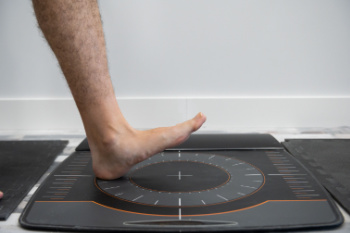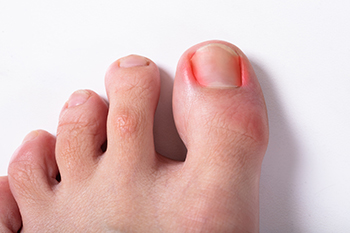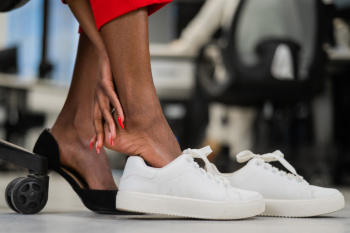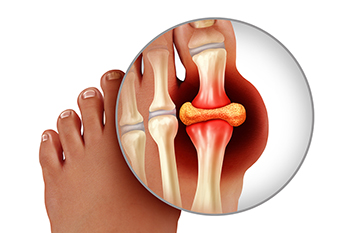Items filtered by date: October 2024
Body Pain That Radiates to and From the Feet

Radiating body pain that affects the feet can stem from several underlying conditions, often linked to nerve compression or musculoskeletal issues. Sciatica, for example, occurs when the sciatic nerve, which runs from the lower back down to the legs and feet, is compressed or irritated, causing sharp or burning pain that radiates to the feet. Herniated discs, spinal stenosis, or pinched nerves in the lower back can also trigger foot pain. Additionally, conditions like peripheral neuropathy, often seen in diabetic patients cause tingling, numbness, or burning sensations that start in the feet and may spread upwards. This type of pain can severely impact mobility and daily functioning, and treatment depends on the underlying cause. If you have foot pain without an obvious cause, it is suggested that you visit a podiatrist who can determine the underlying cause and provide appropriate treatment.
Foot Pain
Foot pain can be extremely painful and debilitating. If you have a foot pain, consult with Peter Siroka, DPM from Connecticut. Our doctor will assess your condition and provide you with quality foot and ankle treatment.
Causes
Foot pain is a very broad condition that could be caused by one or more ailments. The most common include:
- Bunions
- Hammertoes
- Plantar Fasciitis
- Bone Spurs
- Corns
- Tarsal Tunnel Syndrome
- Ingrown Toenails
- Arthritis (such as Gout, Rheumatoid, and Osteoarthritis)
- Flat Feet
- Injury (from stress fractures, broken toe, foot, ankle, Achilles tendon ruptures, and sprains)
- And more
Diagnosis
To figure out the cause of foot pain, podiatrists utilize several different methods. This can range from simple visual inspections and sensation tests to X-rays and MRI scans. Prior medical history, family medical history, and any recent physical traumatic events will all be taken into consideration for a proper diagnosis.
Treatment
Treatment depends upon the cause of the foot pain. Whether it is resting, staying off the foot, or having surgery; podiatrists have a number of treatment options available for foot pain.
If you have any questions, please feel free to contact our office located in Stamford, CT . We offer the newest diagnostic and treatment technologies for all your foot care needs.
Biomechanics of the Ankle

The ankle's movement and stability rely on bones, ligaments, and muscles working together. The main bones involved are the tibia, fibula, and talus. These form the ankle joint, which allows the foot to move up and down. Ligaments, like the deltoid, anterior talofibular, and calcaneofibular ligaments, help keep the ankle stable and control side-to-side movements. When we walk, the ankle flexes upwards when the heel touches the ground and pushes down as we lift the foot off. In cases of severe damage or arthritis, ankle replacement surgery may be needed, where the joint is replaced with artificial parts to restore movement. If you have ankle pain or discomfort, it is suggested that you schedule an appointment with a podiatrist who can diagnose the problem and recommend treatments to help you regain proper walking function and stability.
If you have any concerns about your feet, contact Peter Siroka, DPM from Connecticut. Our doctor can provide the care you need to keep you pain-free and on your feet.
Biomechanics in Podiatry
Podiatric biomechanics is a particular sector of specialty podiatry with licensed practitioners who are trained to diagnose and treat conditions affecting the foot, ankle and lower leg. Biomechanics deals with the forces that act against the body, causing an interference with the biological structures. It focuses on the movement of the ankle, the foot and the forces that interact with them.
A History of Biomechanics
- Biomechanics dates back to the BC era in Egypt where evidence of professional foot care has been recorded.
- In 1974, biomechanics gained a higher profile from the studies of Merton Root, who claimed that by changing or controlling the forces between the ankle and the foot, corrections or conditions could be implemented to gain strength and coordination in the area.
Modern technological improvements are based on past theories and therapeutic processes that provide a better understanding of podiatric concepts for biomechanics. Computers can provide accurate information about the forces and patterns of the feet and lower legs.
Understanding biomechanics of the feet can help improve and eliminate pain, stopping further stress to the foot.
If you have any questions please feel free to contact our office located in Stamford, CT . We offer the newest diagnostic and treatment technologies for all your foot and ankle needs.
Do Your Child's Feet Hurt?
Care for Ingrown Toenails

Ingrown toenails occur when the edge of the toenail grows into the surrounding skin, causing pain, swelling, and sometimes infection. This common condition usually affects the nail on the big toe and can result from improper nail trimming, wearing tight shoes, or injury to the toe. In some cases, a naturally curved nail shape increases the likelihood of developing an ingrown toenail. To prevent or treat ingrown toenails, it is important to trim nails straight across and avoid cutting them too short. Wearing shoes that provide enough room for your toes can also help. If left untreated, ingrown toenails can lead to more serious complications, such as infection, abscess formation, or even the need for surgical removal of part of the nail. If you have an ingrown toenail, it is suggested that you promptly visit a podiatrist who can offer you correct treatment.
Ingrown toenails can become painful if they are not treated properly. For more information about ingrown toenails, contact Peter Siroka, DPM of Connecticut. Our doctor can provide the care you need to keep you pain-free and on your feet.
Ingrown Toenails
Ingrown toenails occur when a toenail grows sideways into the bed of the nail, causing pain, swelling, and possibly infection.
Causes
- Bacterial infections
- Improper nail cutting such as cutting it too short or not straight across
- Trauma to the toe, such as stubbing, which causes the nail to grow back irregularly
- Ill-fitting shoes that bunch the toes too close together
- Genetic predisposition
Prevention
Because ingrown toenails are not something found outside of shoe-wearing cultures, going barefoot as often as possible will decrease the likeliness of developing ingrown toenails. Wearing proper fitting shoes and using proper cutting techniques will also help decrease your risk of developing ingrown toenails.
Treatment
Ingrown toenails are a very treatable foot condition. In minor cases, soaking the affected area in salt or antibacterial soaps will not only help with the ingrown nail itself, but also help prevent any infections from occurring. In more severe cases, surgery is an option. In either case, speaking to your podiatrist about this condition will help you get a better understanding of specific treatment options that are right for you.
If you have any questions please feel free to contact our office located in Stamford, CT . We offer the newest diagnostic and treatment technologies for all your foot and ankle needs.
Causes of Heel Pain

Heel pain is a common issue, often caused by various conditions, including plantar fasciitis, Achilles tendinitis, heel spurs, and bursitis. Plantar fasciitis, one of the most frequent causes, results in stabbing pain due to inflammation in the plantar fascia, a thick band of tissue connecting the heel to the toes. Pain is often felt first thing in the morning or after periods of inactivity. Achilles tendinitis occurs from overuse or strain on the Achilles tendon, causing pain at the back of the heel. Heel spurs are calcium deposits that develop over time and can lead to sharp pain with movement. Bursitis is inflammation of the bursa, small fluid-filled sacs that cushion bones, which can cause tenderness and discomfort in the heel. Treatment for heel pain depends on the cause but may include wearing supportive footwear or medical intervention like injections. If you have persistent heel pain, it is suggested that you schedule an appointment with a podiatrist for a proper diagnosis and treatment.
Many people suffer from bouts of heel pain. For more information, contact Peter Siroka, DPM of Connecticut. Our doctor can provide the care you need to keep you pain-free and on your feet.
Causes of Heel Pain
Heel pain is often associated with plantar fasciitis. The plantar fascia is a band of tissues that extends along the bottom of the foot. A rip or tear in this ligament can cause inflammation of the tissue.
Achilles tendonitis is another cause of heel pain. Inflammation of the Achilles tendon will cause pain from fractures and muscle tearing. Lack of flexibility is also another symptom.
Heel spurs are another cause of pain. When the tissues of the plantar fascia undergo a great deal of stress, it can lead to ligament separation from the heel bone, causing heel spurs.
Why Might Heel Pain Occur?
- Wearing ill-fitting shoes
- Wearing non-supportive shoes
- Weight change
- Excessive running
Treatments
Heel pain should be treated as soon as possible for immediate results. Keeping your feet in a stress-free environment will help. If you suffer from Achilles tendonitis or plantar fasciitis, applying ice will reduce the swelling. Stretching before an exercise like running will help the muscles. Using all these tips will help make heel pain a condition of the past.
If you have any questions please contact our office located in Stamford, CT . We offer the newest diagnostic and treatment technologies for all your foot and ankle needs.
Dietary Guidelines for Gout

Gout is a form of arthritis caused by the buildup of uric acid crystals in the joints, leading to intense pain and inflammation, particularly in the feet. This condition often strikes the big toe, causing redness, swelling, and severe discomfort. To manage gout effectively, it is important to be mindful of dietary choices. Foods high in purines, such as red meat, organ meats, and certain seafood, should be avoided as they can increase uric acid levels. Alcohol and sugary beverages also contribute to the problem. Instead, focus on consuming low-purine foods like fruits, vegetables, whole grains, and low-fat dairy products. Staying hydrated by drinking plenty of water can help prevent uric acid buildup. Gout can cause intense foot pain, and completing daily activities may become difficult. If you have had one or more gout attacks, it is suggested that you are under the care of a podiatrist who can help you to manage this condition.
Gout is a painful condition that can be treated. If you are seeking treatment, contact Peter Siroka, DPM from Connecticut. Our doctor will treat your foot and ankle needs.
What Is Gout?
Gout is a form of arthritis that is characterized by sudden, severe attacks of pain, redness, and tenderness in the joints. The condition usually affects the joint at the base of the big toe. A gout attack can occur at any random time, such as the middle of the night while you are asleep.
Symptoms
- Intense Joint Pain - Usually around the large joint of your big toe, and it most severe within the first four to twelve hours
- Lingering Discomfort - Joint discomfort may last from a few days to a few weeks
- Inflammation and Redness -Affected joints may become swollen, tender, warm and red
- Limited Range of Motion - May experience a decrease in joint mobility
Risk Factors
- Genetics - If family members have gout, you’re more likely to have it
- Medications - Diuretic medications can raise uric acid levels
- Gender/Age - Gout is more common in men until the age of 60. It is believed that estrogen protects women until that point
- Diet - Eating red meat and shellfish increases your risk
- Alcohol - Having more than two alcoholic drinks per day increases your risk
- Obesity - Obese people are at a higher risk for gout
Prior to visiting your podiatrist to receive treatment for gout, there are a few things you should do beforehand. If you have gout you should write down your symptoms--including when they started and how often you experience them, important medical information you may have, and any questions you may have. Writing down these three things will help your podiatrist in assessing your specific situation so that he or she may provide the best route of treatment for you.
If you have any questions, please feel free to contact our office located in Stamford, CT . We offer the newest diagnostic and treatment technologies for all your foot care needs.

